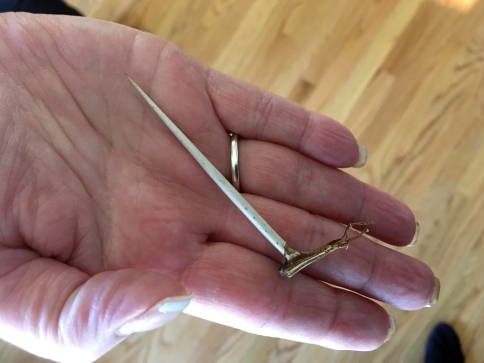| When Civil War Looms
|
|
| Thursday, May 16, 2019 | |
We are a nation at war. With each other.
For now, the battles are fought with blogs rather than bombs, tweets rather than tanks. Still, we appear to be inching toward a civil war of values.
So where does the Bible fit into a culture like ours? What exactly is the role of Scripture in a divided nation? And can we really expect the Bible to have a hearing as the fighting heats up?
These are the questions that gushed over the banks of my mind as I held a copy of the American Bible Society’s 1864 annual report. Recalling that this book was released right in the middle of a literal Civil War (1861-1865) I was dying to know: What was their perspective on the conflict that ultimately engulfed the nation? What role did the Bible have during these tumultuous years?
The testimony in the following excerpts from the 1864 report are profound:
(End of quote!)
You and I can do little to stop whatever cultural clashes may be ahead. But we need not doubt the power of God—and the power of His Word. It’s a lesson America learned in the first Civil War. May that truth comfort us as we move toward the second.
|
|
| Exit Row
|
|
| Thursday, May 09, 2019 | |
I won the lottery! Well…not really. It only felt that way, when on a recent flight to Pennsylvania, I was seated in an exit row. For those who don’t travel much, sitting in an exit row seat means you don’t have to hunch, lurch, twist and otherwise contort your body to fit into what the airlines claim is a seat. The amount of legroom is almost humane. But the gift of this non-smooshed seat comes with a catch. A flight attendant actually “interviews” you just before take-off. You must confirm that you… A. Will read and comply with the emergency instructions. B. Are strong and able enough to assist others. C. Promise to assist others getting off the plane, should a disaster strike. I was intrigued by the language of the exit row safety card. It said that we exit row passengers must be able to:
Because air safety is a life-and-death issue, it got me to thinking about eternal life and death issues. What if we took spiritual rescue just as seriously? Wouldn't we “read and comply” with God’s emergency instructions? Wouldn’t we make sure we were spiritually strong enough to assist our lost neighbors, friends, and coworkers? Shouldn’t the fact that we’ve been “rescued” by Christ motivate us to help others escape the flames of judgment to come? I noticed a lot of intense verbs in the flight card instructions: pull, push, shove, hold, turn, reach, lift out. But how active am I in the spiritual rescue of others? Do I go down on my knees for them in intercessory prayer? Do I shoulder their burdens? Do I hold out Christ’s words of life—or am I embarrassed to do so? Paul wrote in Colossians 1:29, “To this end, I strenuously contend with all the energy Christ so powerfully works in me.” Time to get serious about spiritual rescue. Time to learn from that flight safety card so we can help others “assess, select, and follow a safe pathway”—Jesus!
|
|
| Always Forgive You
|
|
| Thursday, May 02, 2019 | |
She was just seven years old. But Lynnette had clearly crossed a line. It was an offense that called for an apology. I went to her room wanting to teach her that an apology is more than a quickly mumbled, “Sorry.” It means naming your offense, acknowledge that it was wrong, and then asking for forgiveness. With a bit of prompting, Lynnette came through with a very nice apology. As she uttered the words, “Will you forgive me?” I looked her squarely in the eyes (I was down on one knee). I said, “Of course I forgive you. I’ll always forgive you, Lynnette.” But just two weeks later, the offense was mine, and Diana let me know it was my turn to apologize to our daughter. I found Lynnette in her bedroom. Having named my offense and apologized for hurting her, I then asked, “Will you please forgive me?” As I look back, I’m not sure what I expected. Maybe a mumbled, “okay” or something like that. Lynnette replied sweetly and without hesitation, “Of course I forgive you. I’ll always forgive you, Daddy.” It was almost as if a recorder was playing back my exact words from two weeks prior. Not one teeny smidge of hesitation in her voice. There was only kindness and generosity. Does this sound familiar? Can you think of someone else who freely assures His children, “Of course I’ll forgive you. I’ll always forgive you”?
1 John 1:9 is such a familiar verse that it may well have become mundane to some of us. Hear it again: “If we confess our sins (agree with God, admit our wrong), he is faithful (utterly reliable and 100 percent dependable) and just (the wrong we’ve done is paid for by Jesus Himself to meet the requirements of a holy God) to forgive us our sins (drop all charges and give us the full standing of legal justification) and to cleanse us from all unrighteousness” (a slate wiped fully clean!). It’s not just the “little” sins He cleans up. It’s all of them. The big sins. The premeditated sins. The you-wouldn’t-speak- to-me-again-if-you-knew-I’d-done-that kind of sins. He cleanses us from every last streak and stain, every dark mark against our souls. Astounding!
It happened to the woman caught in adultery. It happened with the prodigal son in Jesus’ story. It happened with David, who committed the double crimes of adultery and murder.
Person after person . . . sin after sin . . . crime after crime . . . ask for forgiveness and it is yours! Remember this the next time the voice in your head whispers, You’ve confessed this sin so many times, how can you even think about asking for forgiveness! Or maybe you’ll hear this old accusation: A true Christian wouldn’t have done what you’ve just done! You will never beat this sin! If the voice sounds like a hiss, it is so only because it belongs to a serpent. You know his name. You know his destination. So resist him. Claim the name of the King who defeated him on a hill outside Jerusalem two thousand years ago. As you claim the lovely name of Jesus, hear those lovely words one more time: “Of course I forgive you! I’ll always forgive you!”
Jon's new book, Kids Say the Wisest Things--is available at https://www.moodypublishers.com/ or Amazon. Download a free sample chapter and watch a video clip at: http://kidssaythewisestthings.com/
|
|
| I Am Not Macho
|
|
| Thursday, April 25, 2019 | |
Deep inside I’ve always wished I was more macho. The barrel-chested “Mr. Brawny” brand of guy. Alas, I’m a smidge over five foot eight and decidedly “un-brawny.” So why the fixation? A macho guy wouldn’t have given a second thought to flying with a World Vision team to Senegal. But I did. A macho guy would scarcely have noticed the beetles crawling under the door of our hotel, or the lizard that seemed to chuckle at me as he skittered across the window curtain. Me? I was a bit squeamish, especially as I eyeballed a spider on the wall that the lizard was supposed to have eaten–but didn’t. Mr. Macho would have been fine with the mud huts we saw everywhere in the Tattaguine region of Senegal. He could easily have peered into the dirty wells we saw in village after village and dismissed from his mind the reality that tots and teens and grandmas and grandpas all drink this dirty stuff they claimed as water. And sometimes get sick from it. I was downright shocked when our World Vision host recounted his experience of giving kids bottles of pure water, only to watch them dump out the water—not trusting it because they had never seen anything that clear or clean. (The plastic bottles, however, were highly prized).
Mr. Macho wouldn’t have squirmed at all listening to World Vision project director Michel describing the “food insecurity” that so many of the rural Senegalese people face. But I’m sure I flinched as Michel described “coping strategies”–the way these people are forced to sell off the one goat they might own…or maybe send their twelve year old daughter into the city to get a job to pay for food. So many of the girls come back robbed, either of their possessions or their virtue, and they often contract AIDS.
Macho Man could have taken all this in and never once have wiped away a tear or stifled a low moan in the soul. Me? I cried. I am not macho. And if being macho is a core value for you, then stay as far away as possible from World Vision. Never dare to travel with them. Or sponsor a child. To do so might wrench a tear from your eye…or a sob from your soul. Caring—at the heart level—has always cost this much. To see the World Vision team gladly paying this price in Senegal (as these reckless lovers of Jesus do in nearly 100 countries around the world) is beyond macho. It is magnificent. My name is Jon. I am not macho. |
|
| About that Crown of Thorns
|
|
| Thursday, April 18, 2019 | |
As carefully as I could, I maneuvered backward a bit…then a bit more. Just a t-e-e-n-y bit more. (I was peering through a camera monitor). The idea was to capture a video clip of my friend, Dr. Charlie Dyer, promoting an upcoming trip to Israel. Standing on the Mount of Olives, the view of the Old City of Jerusalem offered the quintessential backdrop. Framing the shot, I needed to step back to make sure enough of the fabulous city walls were in view. Easier said than done, because of all the tourists. And then it happened. Something very sharp and very painful jabbed at my elbow. It was a thorn. But not like the thorns I knew as a kid. In the backyard of our home grew a rose bush which seemed to me far more adept at snatching our baseballs then sprouting blooms. The length of a rose bush thorn is about a quarter of an inch, not much more. And for years, that’s how I envisioned Christ’s crown. But the thorn that I backed into on the Mount of Olives was easily two inches long. It was tough—like a nail. I know, because I nearly stabbed myself trying to pluck it off the stem and take it home as a souvenir.
When the Bible speaks of a crown of thorns, it almost certainly refers to the thing that jabbed me. Meaning, that crown would have felt more like nails than thorns. Archaeological finds at ancient Roman crucifixion sites now prove the point. Recovered skulls show extensive fractures from the very type of thorns that jabbed my elbow. My purpose here is not to disgust you, but to engage you. Because the Easter story is so familiar to many of us, it can feel more like a faded postcard than a real-life drama. But it was real. The chains, the whip, the nails, the cross—and that hideous crown—all real. The only question is whether or not our gratitude is real. It's easy to let the Easter story remain a flat and faded relic of history. But we must not. We dare not. God forbid our sense of gratitude be one whit less than the pain Christ felt at the point of the thorns and nails! |
|
| Records per page First Prev 49 50 51 52 53 54 55 56 57 58 of 127 Next Last | |
 Jon Gauger Jon Gauger |
|||||||||||||||
| Thursday Thought | |||||||||||||||
|
|
|||||||||||||||
Recent Posts
|




